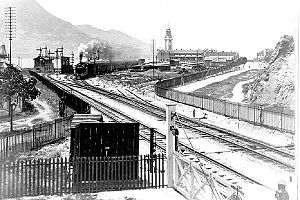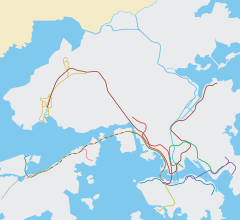Kowloon railway station (KCR)
Kowloon 九龍 | |||||||||||
|---|---|---|---|---|---|---|---|---|---|---|---|
| KCR station | |||||||||||
 A train departing from Kowloon station, picture taken in 1916. | |||||||||||
| General information | |||||||||||
| Location | Tsim Sha Tsui, Hong Kong | ||||||||||
| Coordinates | 22°17′38″N 114°10′13″E / 22.29389°N 114.17028°E | ||||||||||
| Owned by | Kowloon-Canton Railway Corporation | ||||||||||
| Operated by | Kowloon-Canton Railway Corporation | ||||||||||
| Line(s) | Kowloon–Canton Railway (British Section) | ||||||||||
| Connections | Bus, public light bus | ||||||||||
| Construction | |||||||||||
| Structure type | At-grade | ||||||||||
| History | |||||||||||
| Opened | 28 March 1916 | ||||||||||
| Closed | 29 November 1975 | ||||||||||
| Former services | |||||||||||
| |||||||||||
| |||||||||||

Kowloon station (Chinese: 九龍車站), colliquially Old Tsim Sha Tsui Terminal, located in Tsim Sha Tsui on the present site of the Hong Kong Cultural Centre, was the former southern terminus of the Kowloon–Canton Railway (KCR).
History
[edit]The first Kowloon station was a temporary structure built near the (now demolished) Post Office on Salisbury Road in 1909 and served until the permanent station was completed.[citation needed] Regular service between Canton and Kowloon began on 1 October 1910.[1]
The new station was designed by Arthur Benison Hubback and built on reclaimed land overlooking the harbour. Work on the foundations started in May 1913, and the construction of the station began on 1 March 1914. It was completed on 1 March 1916, and the station was officially opened on 28 March 1916.[2]
The building consisted of a two-storey L-shaped terminal building with a clock tower. It was designed in a Edwardian Classical Revival style, and built had a steel frame with red brick cladding as well as white granite columns, architraves and pediments.[2] On the north end of the station was a covered walkway which led to two covered elevated platforms. A freight station was located a mile north of the station.
Relocation
[edit]Owing to lacking of space for expansion, the southern terminus of the railway was moved from Tsim Sha Tsui to a new station named Hung Hom on the new reclaimed land from Hung Hom Bay in 1974. The Hong Kong Cultural Centre was constructed on the site.[3]
After its relocation to Hung Hom (also replacing the old Hung Hom station) in 1974, the new southern terminus of the KCR, the railway which was renamed KCR East Rail in the late 1990s.
Preservation campaign
[edit]
A campaign was mounted to preserve the 60-year-old red brick terminus. The Kowloon Residents' Association wrote to the Colonial Secretary in 1970; the Tsim Sha Tsui Neighbourhood and Welfare Association also wrote to the Colonial Secretary in 1975, and again in May 1977.[4]
A petition[4] was mounted by the Heritage Society, and sent to the then Governor, Murray MacLehose on 29 July 1977.[5] The Government rejected the petition, and its request for an independent inquiry into the draft area development plan.[5] It argued that a new cultural complex would assume the role enjoyed by the building, and that the plans for a new cultural complex to be erected on the site were too far advanced to be altered. The Heritage society charged that the Government was engaged in dirty tricks,[6] and was misleading the public.
The Heritage Society escalated lobbying effort, and petitioned Her Majesty Queen Elizabeth II[7] with a file containing some 15,000 signatures in February 1978, hoping for royal intervention.[5] Within 48 hours of the Royal decision, the demolition crew had already moved in.[8]

Clock Tower
[edit]The Clock Tower is the only part of the old station in Tsim Sha Tsui remaining at its own site. Six pillars of the station building were moved to the Urban Council Centenary Garden in Tsim Sha Tsui East. After decades at other locations, including the East Rail depot at Ho Tung Lau, the clock tower's bell was returned to its original home in September 2010.[9]
See also
[edit]- Tsim Sha Tsui station
- Hung Hom station
- East Tsim Sha Tsui station
- Hong Kong West Kowloon railway station
References
[edit]- ^ "Declared Monuments in Hong Kong – Kowloon". Antiquities and Monuments Office, Government of HKSAR. Archived from the original on 13 May 2011. Retrieved 14 December 2007.
- ^ a b "The Kowloon-Canton Railway (British Section) Part 3 – the construction of Kowloon Station". The Industrial History of Hong Kong Group. 16 December 2015.
- ^ Richard Frost, (1 May 1998) History floats aboard Star ferries Archived 4 October 2008 at the Wayback Machine, The Standard
- ^ a b Strong public support to keep KCR buildings, South China Morning Post, 3 August 1977
- ^ a b c Gary Coull, (9 February 1978) Save railway station plea to Queen, South China Morning Post
- ^ Michael Chugani, (9 June 1978) Foul tactics used in KCR fight?, The Standard
- ^ Only a Royal Decision Can Save KCR Station, The Star, 11 February 1978
- ^ Michael Chugani, (8 June 1978) No place for history in money conscious HK, The Standard
- ^ "Bell from former Kowloon-Canton Railway Clock Tower returns home (with photo)". Development Bureau, Government of HKSAR. Retrieved 3 November 2011.
External links
[edit]- Defunct railway stations in Hong Kong
- Former Kowloon–Canton Railway stations
- Former buildings and structures in Hong Kong
- Monuments and memorials in Hong Kong
- Railway stations in Hong Kong opened in 1909
- Railway stations closed in 1974
- 1909 establishments in Hong Kong
- 1974 disestablishments in Hong Kong
- Tsim Sha Tsui

